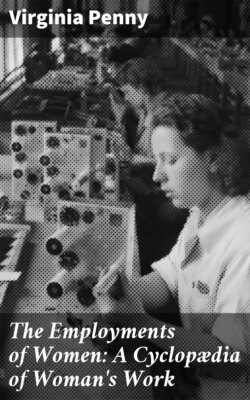Читать книгу The Employments of Women: A Cyclopædia of Woman's Work - Virginia Penny - Страница 39
На сайте Литреса книга снята с продажи.
33. Teachers of Infant Schools.
ОглавлениеTeaching is interesting to those that love children. But I would say, let not those without patience and tenderness, or those whose feelings can in an hour change from the boiling to the freezing point, attempt to teach young children. In ordinary schools, young children are liable to be either cramped or stunted. If children must be placed at school early, let it be where they can exercise their little bodies frequently, and not be confined in school long at a time. To accomplish this, we think the infant school the most efficient. Lord Brougham gives it as his opinion that a child learns more the first eighteen months of its life than at any other period; and that it settles, in fact, at this early age, its mental capacity and future well-being. Mr. Babbington fixes the period of the first nine years as the seedtime of life. Some object to infant schools, on the ground that they divert the mind, and unfit it for continued and concentrated thought in after life. But we cannot think so, unless the course is pursued an unreasonable length of time. The first two years of a child's schooling may be passed profitably in an infant school; at any rate, if the child enters as early as six years of age. Indeed, we think the variety embodied in the infant-school system is one of its most pleasing and useful features. The minds of children cannot rest long on any one subject, any more than their bodies can retain the same posture long at a time. It stagnates thought, prevents boldness of spirit, and stunts the growth of a young child to sit quiet hour after hour. Some mothers send their children early to school to have them out of their way. Such children could be more pleasantly and more efficiently taught in an infant school than in any other. Yet, we are rather inclined to the opinion that a child should be taught the alphabet at home. Gentle but firm treatment is necessary for children, who need much sympathy and affection; and it therefore requires the greatest patience on the part of a teacher, in order to conduct an infant school successfully. Infant schools are scarce in the United States; but still they exist in some parts of New England. There was an infant school in Troy, some time ago (and perhaps it is still in existence), in connection with one of the public schools. The infant-school system has been partially adopted in some of the public schools of our Western cities; and the same system applied to Sabbath schools has been extensively and happily carried into effect, both in the South and West. There are several infant Sabbath schools, of which we know, numbering considerably over one hundred children. These schools are usually conducted by ladies. The exercises are varied, as in day schools, and consist generally of chanting responses, catechism, memorizing from cards, telling Bible stories, lecturing, explaining pictures, singing, &c. This order of exercises, sustained in a lively manner, cannot fail to interest children, and make the school room for them a happy and longed-for place. Nature itself points out the course to be pursued in the education of a child: first, physical training; second, moral training; and third, mental training. Mind and body are so closely united that an injury to one is resented by the other. One is placed as a protector to the other, and will not permit injury to its companion with impunity.
